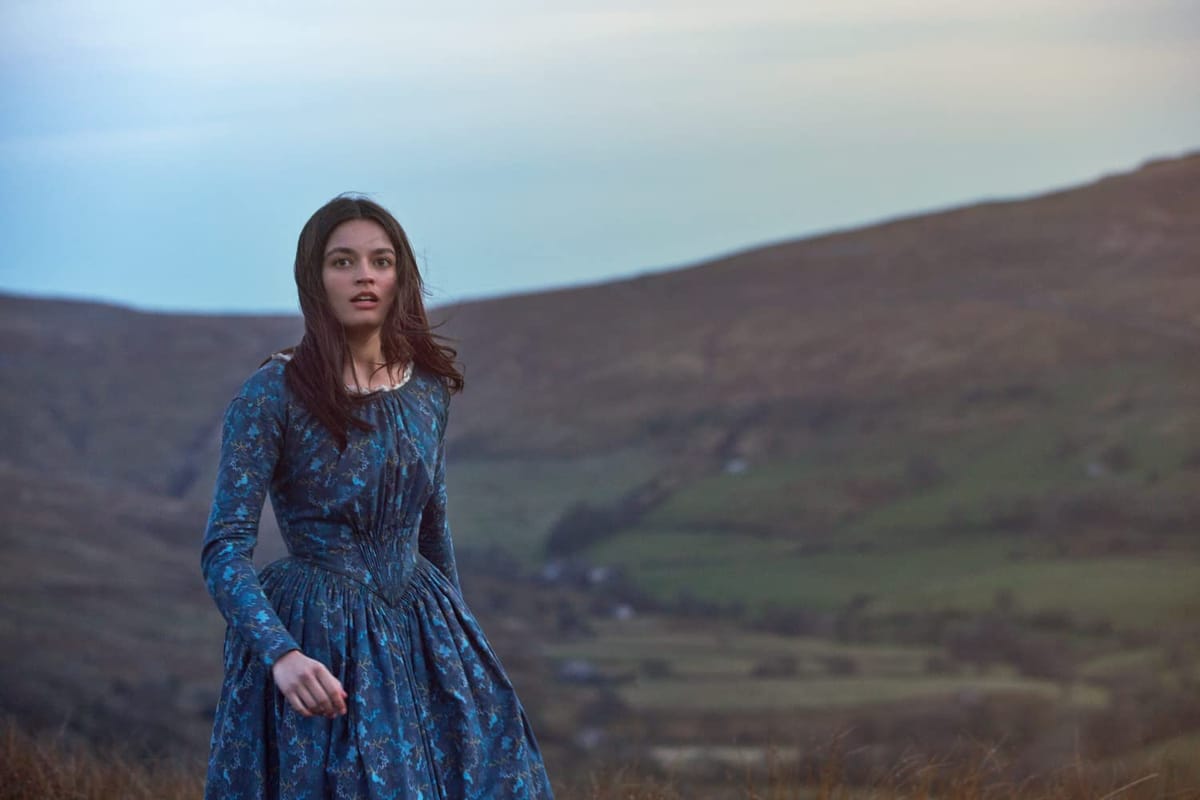Emily

I’ve never read Wuthering Heights. In fact, I know very little about it. I know its author’s name, that it’s considered not only a classic but one of the best novels ever written (just checked, and I missed qualifying that with “in English”), and that there’s a lot of darkness and sadness in it. Although to be honest, I’m not sure about that last bit. Point is, it’s one of the many pieces of culture I’m aware of but haven’t actually partaken in. The benefit of that lack of knowledge is I went into “Emily” with almost no preconceived notions. Sure, I’d seen the trailer. But my unfamiliarity meant that although her life (and death) is a matter of historical record, she may as well be fictional for all the good it did me. Same for Wuthering Heights; I couldn’t expect the movie to follow its beats or relationships or anything, because I don’t know them.
Which is fine! A good movie needs to be able to stand on its own, more or less. Sequels obviously can play off what came before, and cinematic universes are their own topic (for another day). But while knowledge of outside material may deepen my understanding and enjoyment and connection to art, it shouldn’t be a prerequisite. To require it is to make a bunch of assumptions and assertions about your audience. It’s inherently limiting, and implicitly hostile to those on the outside. And even for those who are in the know, you run the risk of leaning too heavily on outside material and failing to craft a compelling story.
Foreshadowing!
“Emily” follows Emily Brontë as she navigates early adulthood, trying to make her way as she feels out of place amongst her family and the surrounding villagers. She is chastised for “childish” pursuits, such as storytelling, and for generally refusing to be domesticated. Her experience of the world outside the home is colored by anxiety, leading her to greatly limit her travels. This story takes place before she’s written Wuthering Heights, as we experience the relationships of her formative years.
And that’s kind of it. The story meanders all over the place, dodging in and out of various things happening to her. Much of it centers on various sorts of youthful shenanigans, from trouble-making to romance to arguing with adults. We don’t see her writing much, nor get a sense of what inspires her or makes her tick. Snippets of her poetry come up from time to time, but they’re rarely the focus of the scene in question. But mostly, not a lot seems to happen.
Granted, there are a few clear dividing lines, as we see certain people become large parts of her life, and once they fade we see her resent their failings. But the act of fleshing out those relationships is drawn out, with lots of dropped threads and nonsensical actions. It’s a lot of “and then, and then, and then”.
But the most frustrating part is how much characterization is done via exposition and assertions about others, with no demonstration to support it. For example, we quickly establish that everyone sees Emily as “strange”, but we never really get why; we’re just expected to accept that, despite her seeming mostly normal. There are a few bits which could be seen as “different”, sure, but we never get the sense it’s a defining characteristic. So goes much of how we learn about the characters; being told, not shown. As a period piece, many of the characters are quite arch, and so all that’s left is to fill in some coloring details. Emily is not, which requires more work for her to feel like a person. And it’s just not there, either on page or in the performance.
The craftsmanship is mostly fine, although the editing was quite jarring at some points. In this pretty chill drama, there were a few blocks where we were jumping between scenes quite rapidly, which was fairly disorienting. And even when you could follow, it kept you unmoored, so those scenes had no weight and may as well have never happened. Again, to be fair, most of the editing was fine, but when it broke it was very noticeable.
My biggest complaint is the score. I often harp on dissonance between it and what’s happening on screen, especially when it’s the scene that feels weak. To me, a score should underline what you’re feeling, giving a more full bodied voice to what’s brewing in your heart. Often, that means complimenting it, but it can even be contradicting it in the right circumstances. But what really bothers me is when it seems the score comes in hard to an otherwise small scene. It stands out, as if the filmmaker wasn’t confident the acting and writing would convey the desired emotions, and so they’re trying to pave over it with music. And “Emily” does this a bunch, with big, dramatic, important sounding music, in moments when there may or may not have been an emotional beat, and it just pulls me out of the film each time.
The point has been made to me that if you know Brontë’s work, be it Wuthering Heights or her poems, there’s a lot for you in this movie. And that’s great! But pointing to her work by having her do things which are referenced by it does nothing to help the film. Especially since it feels like the story aspect was neglected.
Maybe there’s an interesting movie to be made about Brontë’s life and what went into her writing and such. But this ain’t it.